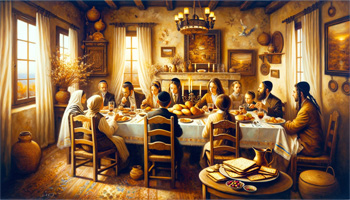 Passover in Israel
Passover in Israel


In the heart of the Middle East, Israel observes a holiday of profound cultural and historical importance – Passover, or 'Pesach' in Hebrew. This sacred festival, deeply rooted in Jewish heritage, commemorates a pivotal moment in history: the liberation of the Israelites from centuries of slavery in Ancient Egypt. Beyond its historical significance, Passover in Israel is a period of deep reflection, unity, and joyous celebration, bringing the nation together to honor this crucial event and reaffirm their commitment to the values of freedom and faith.
The Historical Roots of Passover
Passover is steeped in history, tracing back to the biblical story of Exodus. This ancient narrative describes how Moses, under divine guidance, led the Israelites out of Egypt, freeing them from Pharaoh's tyranny. This escape, marked by the parting of the Red Sea and the ten plagues that befell Egypt, is central to Jewish religious tradition and identity. In Israel, Passover isn't just about recalling a historical event; it's a time to celebrate the enduring spirit of freedom and resilience that defines the Jewish people.
Passover Traditions in Israel
Passover traditions in Israel are rich and varied, with the Seder meal being the highlight. On the first night of Passover, families gather for this special meal laden with symbolic foods. Each item on the Passover Seder plate holds deep significance, representing various aspects of the Israelites' suffering and subsequent liberation. The storytelling aspect of the Seder, where the story of Exodus is recited from the Haggadah, is a fundamental part of the evening, linking generations through the power of narrative.
Matzah: The Bread of Affliction
A central element of Passover is the consumption of matzah, unleavened bread. Matzah symbolizes both the Israelites' haste in leaving Egypt, which did not allow time for the bread to rise, and the humility and simplicity of life. This 'bread of affliction' serves as a poignant reminder of the hardship endured by the ancestors and the value of freedom.
Preparation for Passover
The preparation for Passover in Israeli households is thorough and symbolic. Homes are cleansed of chametz (leavened products), signifying the removal of pride and arrogance, and making way for spiritual renewal. This physical act of cleaning is also seen as a spiritual preparation, making way for introspection and a fresh start.
The Symbolism of the Seder Plate
Each item on the Seder plate is symbolic. The bitter herbs (maror) symbolize the bitterness of slavery, charoset (a mixture of apples, nuts, and wine) represents the mortar used by the Israelite slaves, and the shank bone (zeroa) is a reminder of the Paschal lamb sacrifice. Each element serves to make the historical experiences of the ancestors more tangible for the present generation.
Passover's Universal Message
While deeply rooted in Jewish history, the message of Passover resonates universally. It speaks to the enduring human yearning for freedom and dignity, transcending religious and cultural boundaries. In Israel, a nation built by people who sought refuge from persecution, Passover holds special significance as a testament to the triumph of hope and freedom over oppression.
Modern Celebrations and Reflections
In modern Israel, Passover is a time for both celebration and reflection. While it is rooted in historical and religious traditions, contemporary observances of Passover also reflect the current societal values and realities of the nation. Schools and community centers host educational events and activities, fostering a deeper understanding and connection with the holiday's historical significance.
Passover in Israel is more than a mere commemoration of a past event; it's a living tradition that continues to evolve and resonate. It's a time when the entire nation, from secular to religious, comes together to engage in age-old traditions, while also interpreting them in ways that are meaningful today. The festival's themes of liberation, renewal, and resilience are as relevant in today's world as they were thousands of years ago, continuing to inspire and guide. As families gather around the Seder table each year, they are not only retelling an ancient story but are also reaffirming the timeless values and lessons that define their identity and heritage.